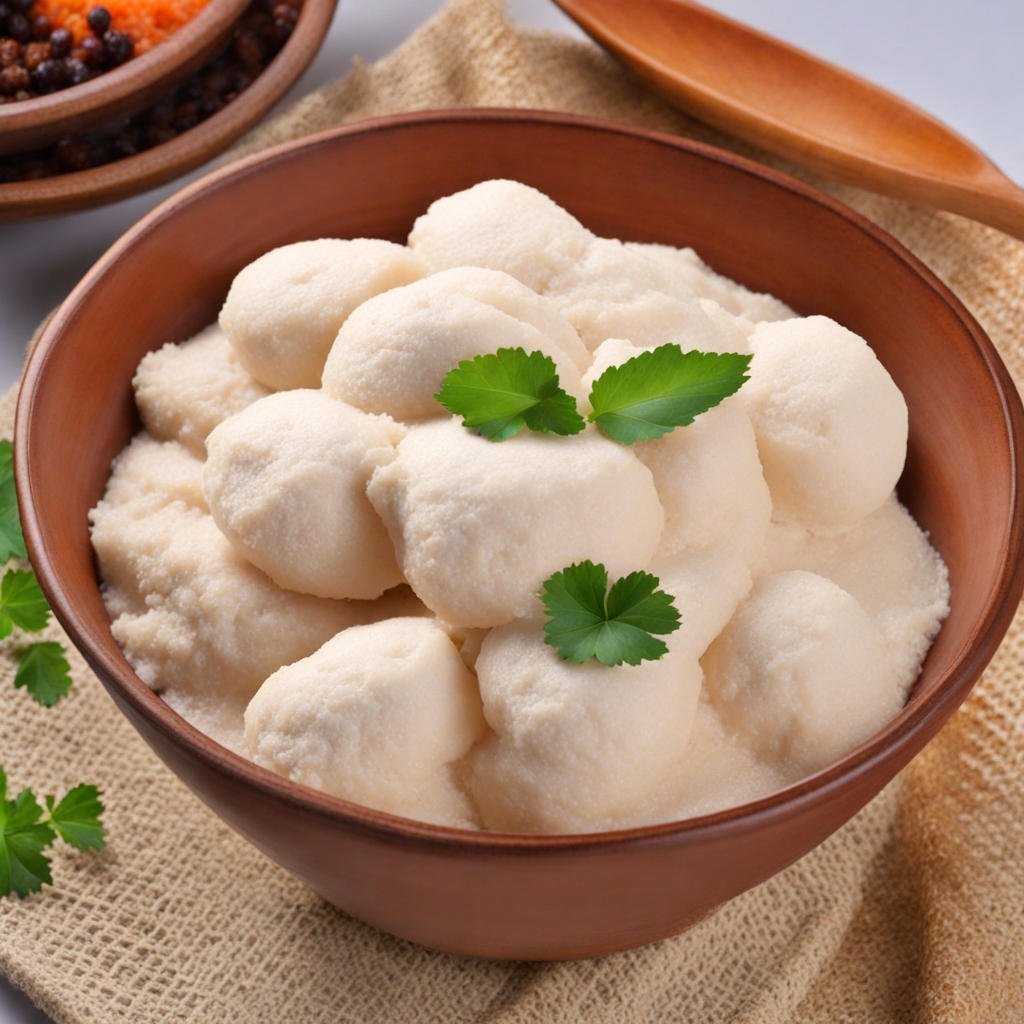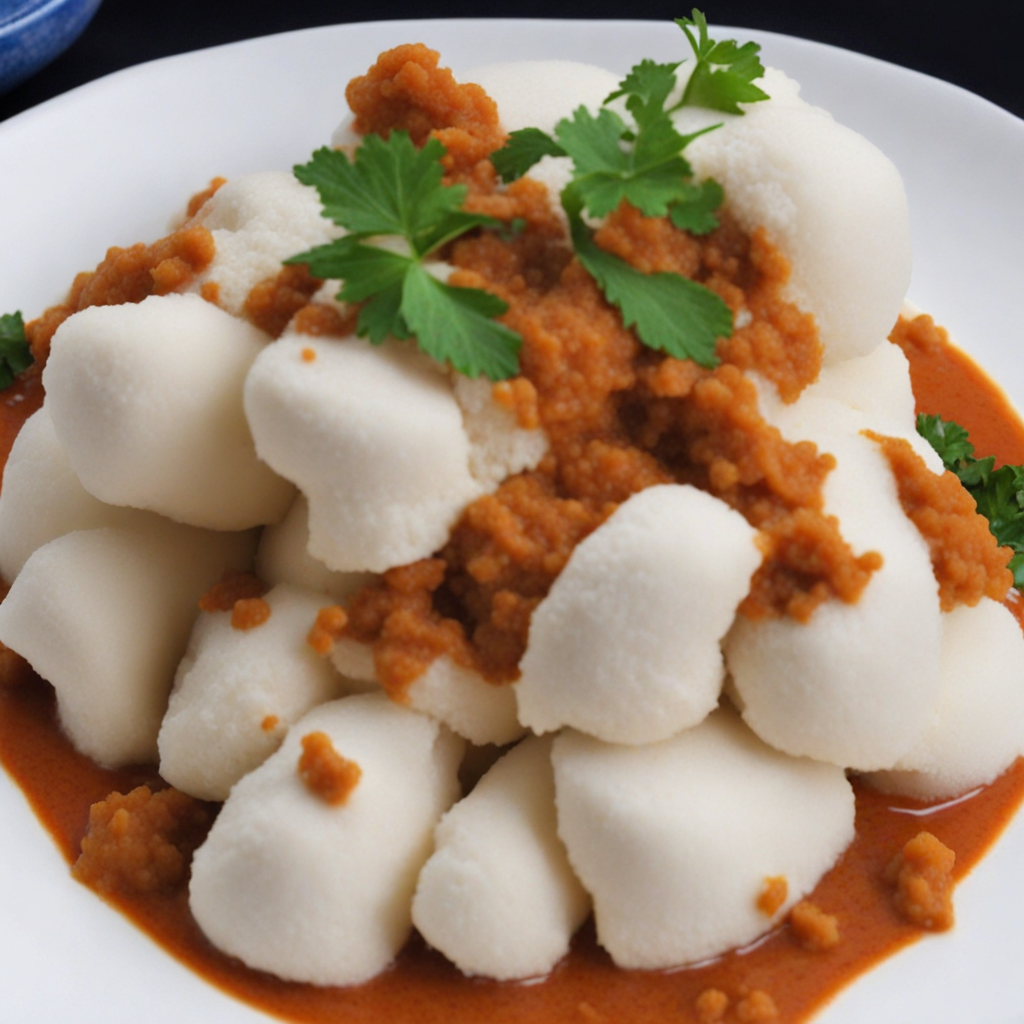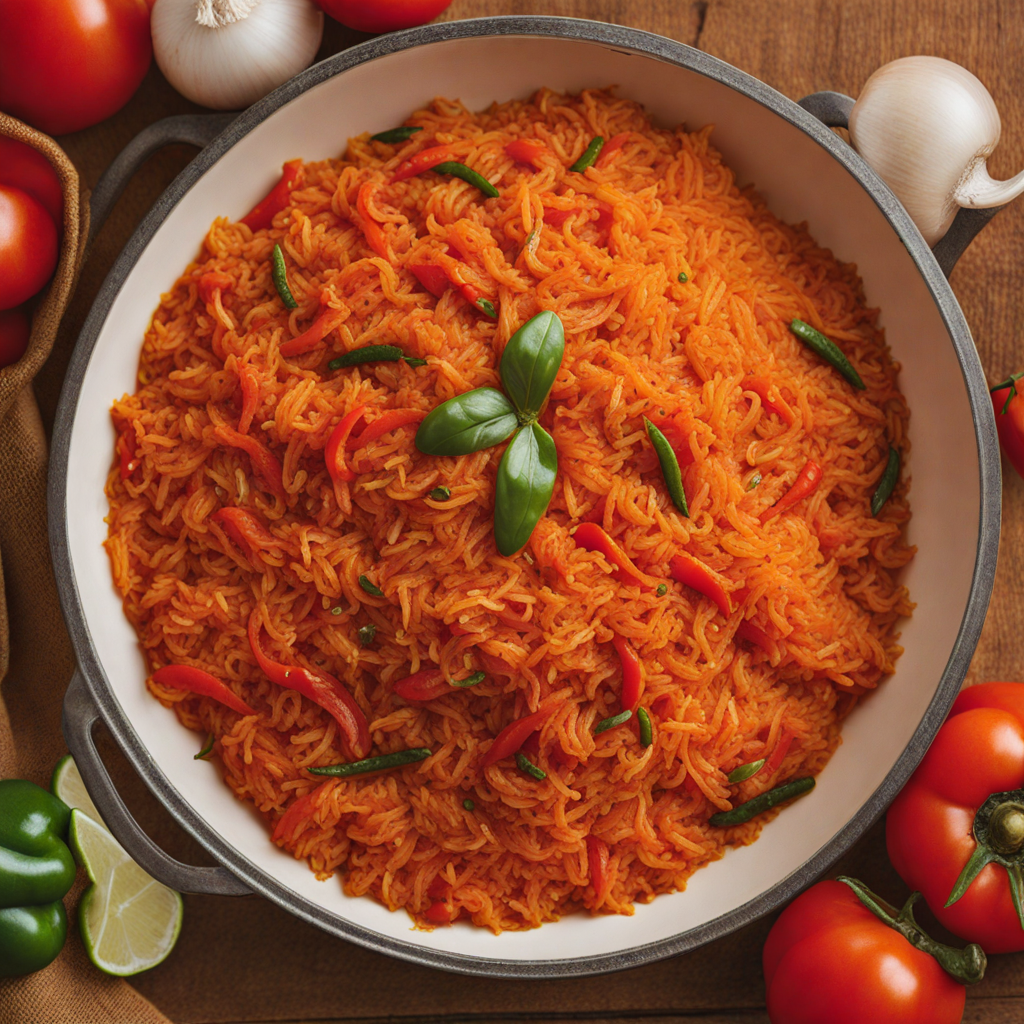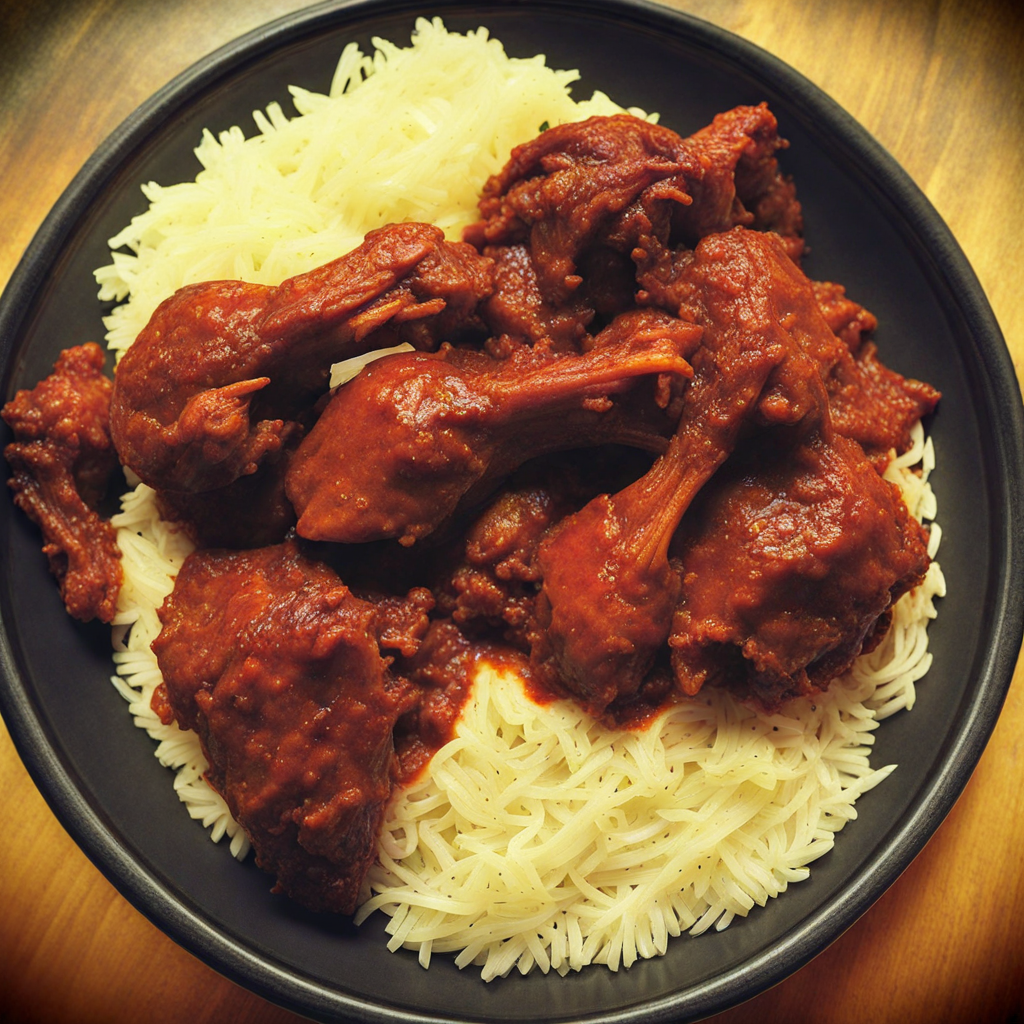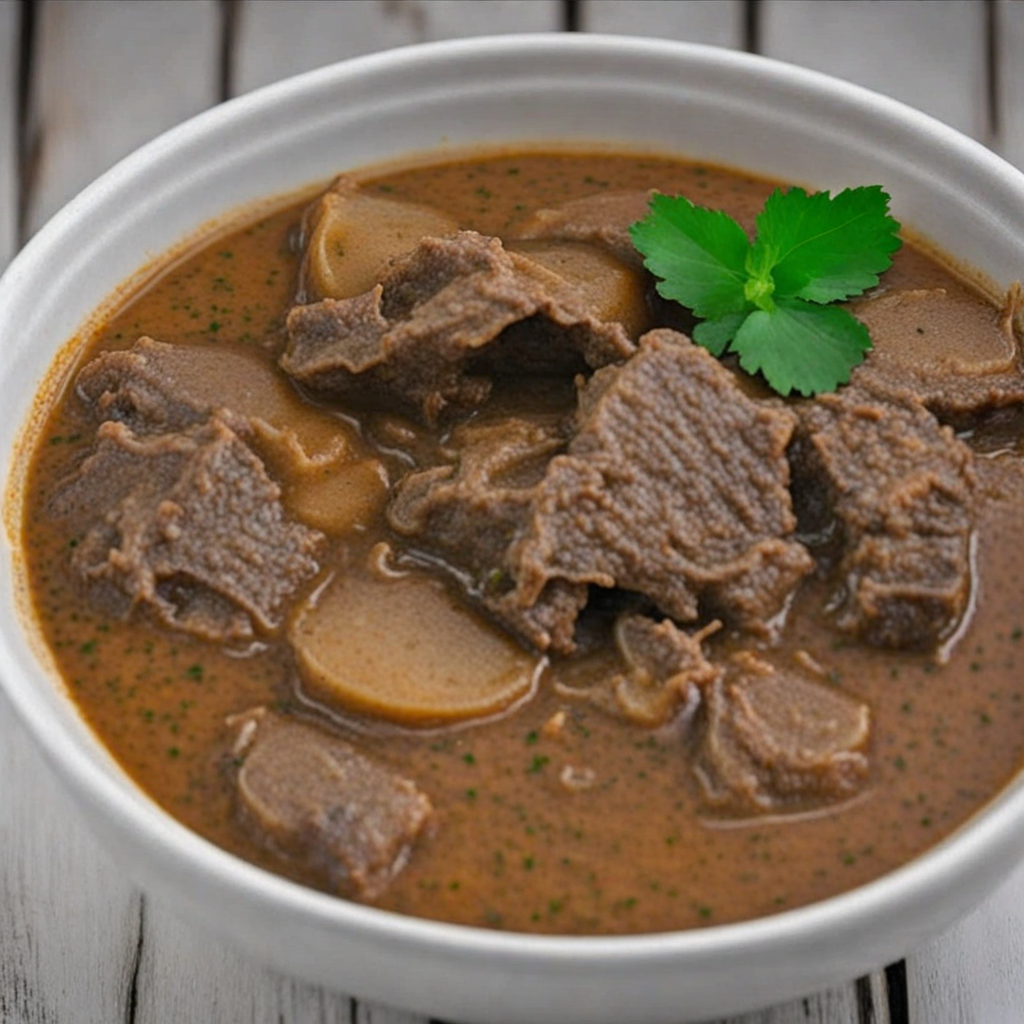Pounded Yam
Pounded Yam is a beloved staple food in Nigeria, cherished for its unique texture and versatility. Made from yam tubers, this dish involves boiling the yams until they are soft and then pounding them into a smooth, stretchy consistency. The result is a fluffy, dough-like substance that has a subtle flavor, allowing it to complement a wide variety of savory dishes. Its appealing elasticity makes it not only fun to eat but also a satisfying accompaniment to rich stews and soups, which are often served alongside it.
How It Became This Dish
Iyan: A Culinary Journey Through Nigeria's Heritage Iyan, also known as pounded yam, is a beloved staple food in Nigeria and other parts of West Africa. This dish, a smooth and stretchy dough made from yam that is pounded until it reaches a desired consistency, serves as both a cultural symbol and a culinary delight. Its rich history, cultural significance, and evolution over time reflect the diverse narratives of Nigeria's people. #### Origins of Iyan Yam (Dioscorea spp.) is one of the oldest cultivated crops in West Africa, believed to have been domesticated over 5,000 years ago. Archaeological evidence suggests that yam cultivation dates back to the time of the ancient kingdoms of Nigeria, such as the Nok culture, which thrived around 1000 BC. The yam tuber became a crucial part of the diet in the region, celebrated for its versatility and nutritional value. Iyan, specifically, arose as a method to prepare yam for more palatable consumption. While yams can be boiled or roasted, pounding them transforms their texture, making them soft and pliable. The practice of pounding yams into a smooth, stretchy dough likely developed as culinary techniques evolved, with the introduction of mortars and pestles, and later, wooden pounding sticks. The labor-intensive process of making Iyan symbolizes both the communal spirit of food preparation and the importance of yam in traditional Nigerian society. #### Cultural Significance Iyan holds a prominent place in the cultural tapestry of Nigeria. It is not just a dish; it represents sustenance, celebration, and community. Traditionally, Iyan is served with various soups and sauces, such as Egusi (melon seed soup), Ogbono (wild mango seed soup), and Efo Riro (vegetable stew), creating a balanced meal that showcases the richness of Nigerian cuisine. In many Nigerian cultures, yam is associated with prosperity, fertility, and strength. It is often referred to as the "king of tubers" and plays a vital role in agricultural festivals and rituals. The New Yam Festival, celebrated by various ethnic groups including the Igbo and Yoruba, marks the end of the harvest season and the beginning of the new one. During this festival, Iyan is prepared and shared as an offering to the ancestors, symbolizing gratitude for a bountiful harvest and the hope for future abundance. Moreover, Iyan is often served during significant life events such as weddings, naming ceremonies, and funerals, serving as a unifying dish that brings families and communities together. It is a marker of hospitality in Nigerian culture; offering Iyan to a guest is a gesture of respect and warmth. #### Iyan in Contemporary Society As Nigeria has modernized, the preparation and consumption of Iyan have adapted while retaining their traditional roots. In urban areas, the traditional method of pounding yam can be labor-intensive and time-consuming. Consequently, innovations such as electric yam pounders and instant Iyan flour have emerged, making the dish more accessible to a broader audience. Instant Iyan flour, made from dehydrated pounded yam, allows for a quick preparation that retains the taste and texture of traditional Iyan, appealing to busy lifestyles without sacrificing authenticity. Despite these modern adaptations, many Nigerians continue to prefer the traditional method of pounding yam, often seen as a family affair that fosters togetherness. The process of pounding yam is often accompanied by lively conversations, songs, and laughter, reinforcing social bonds. This communal aspect of food preparation is essential in maintaining cultural identity amid rapid urbanization and globalization. #### Variations of Iyan While Iyan is predominantly recognized as pounded yam, different regions and ethnic groups in Nigeria have their own variations and names for similar dishes. For instance, in the Yoruba culture, pounded yam is known as "Iyan," while the Igbo might refer to it as "Iyan or Iye." Additionally, yam can be replaced with other starchy tubers, resulting in variations such as "Iyan from cassava" or "Iyan from plantains," each offering unique flavors and textures. In recent years, there has been a growing trend of incorporating Iyan into modern culinary experiences. Chefs and food enthusiasts are experimenting with Iyan, pairing it with international cuisines and contemporary plating techniques. This fusion cuisine seeks to elevate Iyan beyond its traditional context, showcasing its versatility on a global stage. #### The Global Influence of Iyan As Nigerian diaspora communities grow worldwide, so does the reach of Iyan. The dish has found its way into various international culinary scenes, being celebrated in African restaurants and food festivals across continents. This global interest highlights the importance of Iyan as a cultural ambassador, fostering appreciation for Nigerian heritage and cuisine. In addition, the rise of social media platforms has enabled food lovers to share recipes, cooking techniques, and personal stories related to Iyan, further enhancing its visibility. This digital age has allowed for the preservation and dissemination of traditional cuisines, ensuring that dishes like Iyan remain relevant and cherished across generations. #### Conclusion Iyan embodies much more than a simple food item; it is a testament to Nigeria's rich cultural heritage and the communal spirit of its people. From its ancient origins to its place in modern society, Iyan has remained a beloved staple that nourishes both body and soul. As it continues to evolve, Iyan stands as a symbol of resilience, community, and the enduring significance of food in connecting individuals to their history and culture. Whether enjoyed in a bustling city or during a festive gathering, Iyan will always hold a special place in the hearts of Nigerians and food lovers worldwide, serving as a delicious reminder of the ties that bind us across time and space.
You may like
Discover local flavors from Nigeria


